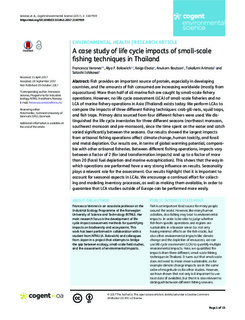A case study of life cycle impacts of small-scale fishing techniques in Thailand
Verones, Francesca; Bolowich, Alya Francesca; Ebata, Keigo; Boutson, Anukorn; Takafumi, Arimoto; Ishikawa, Satoshi
Journal article, Peer reviewed
Published version
Permanent lenke
http://hdl.handle.net/11250/2503087Utgivelsesdato
2017Metadata
Vis full innførselSamlinger
Sammendrag
Fish provides an important source of protein, especially in developing countries, and the amounts of fish consumed are increasing worldwide (mostly from aquaculture). More than half of all marine fish are caught by small-scale fishery operations. However, no life cycle assessment (LCA) of small-scale fisheries and no LCA of marine fishery operations in Asia (Thailand) exists today. We perform LCAs to compare the impacts of three different fishing techniques: crab gill-nets, squid traps, and fish traps. Primary data sourced from four different fishers were used. We distinguished the life cycle inventories for three different seasons (northeast monsoon, southwest monsoon and pre-monsoon), since the time spent on the water and catch varied significantly between the seasons. Our results showed the largest impacts from artisanal fishing operations affect climate change, human toxicity, and fossil and metal depletion. Our results are, in terms of global warming potential, comparable with other artisanal fisheries. Between different fishing operations, impacts vary between a factor of 2 (for land transformation impacts) and up to a factor of more than 20 (fossil fuel depletion and marine eutrophication). This shows that the way in which operations are performed have a very strong influence on results. Seasonality plays a relevant role for the assessment. Our results highlight that it is important to account for seasonal aspects in LCAs. We encourage a continual effort for collecting and modeling inventory processes, as well as making them available, in order to guarantee that LCA studies outside of Europe can be performed more easily.

